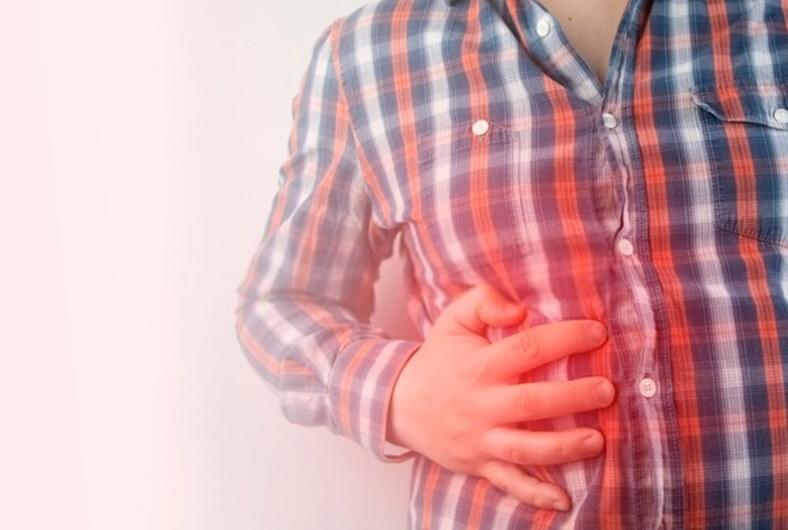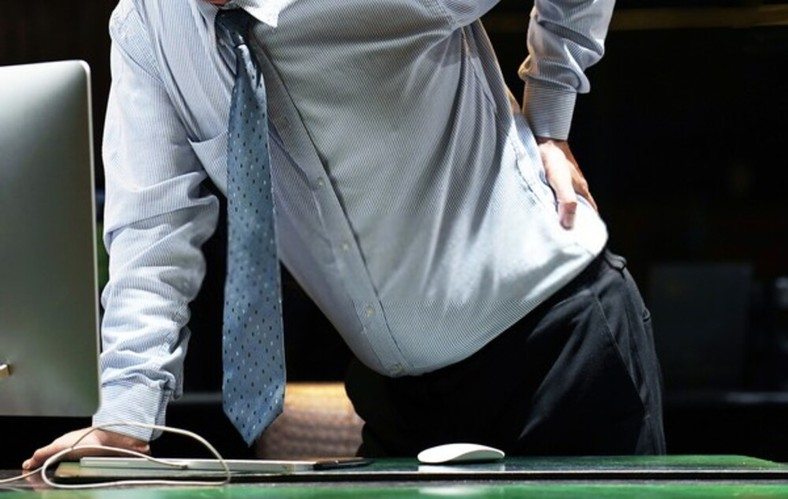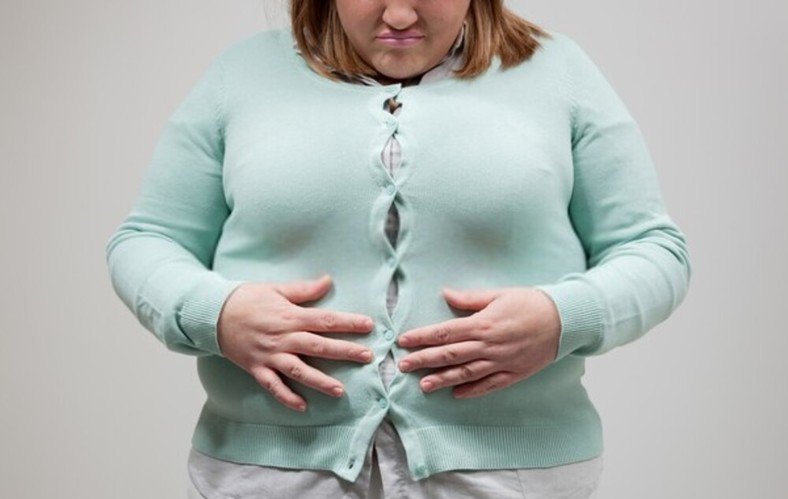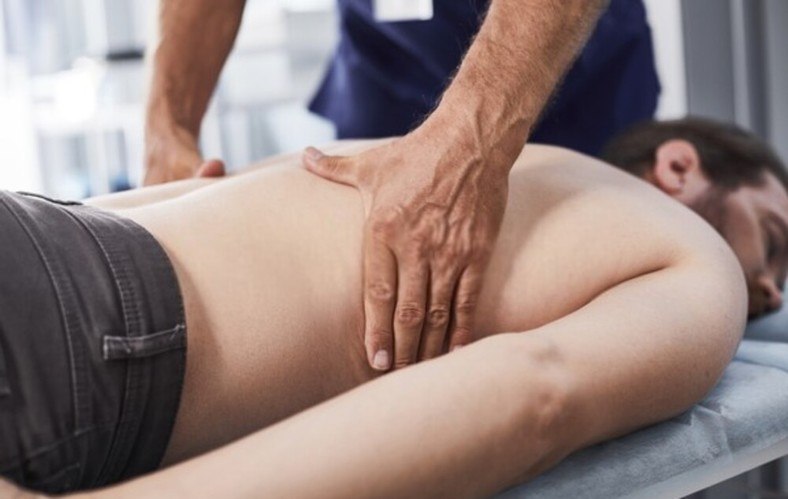We are all aware of the ‘obesity epidemic’ in America. We know that being overweight can lead to diseases, but did you know that it can also cause rib pain?
As obesity increases, so does the incidence of compression fractures in the spine. According to one study, persons with rib pain are more likely to develop spinal fractures as a result of osteoporosis or obesity. Researchers say 1 to 2% of ribs fracture each year because of these conditions.
For the study, they looked at patients with rib pain. Of those, 22% had a previous spinal fracture and 22% had osteoporosis. The researchers then compared the two conditions to figure out if there was a connection between them. They discovered that the incidence of rib pain and fractures was about the same whether or not there was an underlying spine problem.
The key to understanding this result is to realize that people with hip fractures and osteoporosis also have trouble breathing as a direct result of compression in the lungs. Rib pain can be caused by compression on the ribs, which makes it difficult to breathe. It is very difficult to breathe when you are overweight, so it is no surprise that obesity can also cause rib pain.
Can Being Overweight Cause Rib Pain?

The common assumption is that an overweight individual would likely suffer from physical and emotional stress. However, it is not always true, and there has been no known evidence to support this claim. The medical community’s consensus is that obesity does not cause any condition in and of itself; rather, when you add in other unhealthy habits such as smoking, poor dieting practices, or low physical activity level, it can exacerbate the problem.
Researchers looked at 4 991 patients with obesity in a study published in the International Journal of Obesity. They discovered that being overweight had no adverse effect on the heart. In a follow-up study in 2001, a group of doctors at the University of California San Diego reviewed the medical records of 200 patients with rib pain and found that most had been diagnosed with benign lipedema. This condition, sometimes called lipedema, is caused by fat tissue in the upper body (typically in the arms) compressing the lower end of the ribs.
The researchers studied the patients’ medical records and found that 86 percent had been diagnosed with benign lipedema. The patients identified in the study had had a wide range of symptoms:
- Eighty-one percent complained of chest pain.
- Fifty-nine percent had shortness of breath.
- Thirty percent reported nausea and vomiting.
The study’s authors concluded that the condition is relatively common and that rib pain due to benign lipedema can be easily mistaken for other conditions such as heart disease or lung problems.
Pain Around Ribs and Back Symptoms

According to the National Institute of Health, ribs and back pain can be caused by several conditions, including:
Dehydration
Dehydration has a number of negative effects on the body, including inflammation and increased joint pain. You may also experience back pain as an indicator that you need to drink more water. The National Osteoporosis Foundation (NOF) recommends at least six to eight glasses of water per day. If you’re dehydrated, you’re more likely to experience pain.
Not having enough water or fluids can lead to dehydration, which can cause rib pain. Make sure to drink plenty of fluids, especially during hot and humid weather or during physical activity. Learn more about dehydration and how to prevent it by reading Does Diarrhea Cause Weight Loss?.
Obesity
See above under “Can being overweight cause rib pain?” Obesity can increase the pressure on your joints, making them hurt more. In addition, the body doesn’t have enough energy to fuel your muscles properly. This can cause pain and inflammation in muscles and tendons, making it harder to work correctly.
Smoking
The chemicals in tobacco smoke can irritate your muscles and make them painful.
Trauma
If you’ve injured your ribs in some way, especially if you’ve broken one or bruised them, then it’s likely that you’ll experience pain for some time. This is because the soft tissue around your ribs will be inflamed and damaged by the injury. The good news is that this type of rib pain typically resolves on its own within six to eight weeks.
Cancer of the Spine
Cancer can spread to your bones, making them painful. If you have any signs of bone cancer, make sure to talk to your doctor about it.
Other Medical Conditions
You should always consult with your physician before making any changes, whether it’s increasing or decreasing your activity level or changing your diet. Rib pain can also be caused by other more serious conditions such as gallbladder disease, appendicitis; problems with the thyroid gland; or an enlarged prostate (BPH).
The research shows that obesity does not cause rib pain. However, if you are suffering from unexplained chest or back pain, it would be good to see your doctor about it. Large breasts can cause pain because of their weight. It is best to visit a plastic surgeon for breast reduction if you are suffering from this.
What Could Have Caused the Patient’s Rib Pain
Being overweight can sometimes cause rib pain because of the pressure it puts on your ribs. But this is not always the case. In this case, the pain was more likely caused by inflammation of the soft tissue. In addition, the patient had several other symptoms that would indicate that his rib pain was a result of a condition called benign lipedema. Below is a list of the conditions that could cause pain radiating from your upper back to your ribs. If you have any of these symptoms, you should see your doctor immediately. It’s possible that one of these medical conditions could be causing your rib and back pains.

Osteoporosis
Osteoporosis is a disease that results in brittle bones. The effects worsen as a person ages. It is usually not a painless condition, but it is not always painful. However, if you have some other pain conditions such as arthritis or cancer, you should see your doctor about it because it could be causing your rib and back pain.
Are you wondering how body weight can affect the risk of Osteoporosis? Check out our article to learn more about the correlation between osteoporosis and weight.
Osteoarthritis
This condition causes a lot of pain in the joints and bones because of the wear and tear on the joint from normal activities. It’s associated with aging, so it won’t be painful for anyone under 60. However, it is sometimes painful in young people. The symptoms are joint pain, muscle cramps, muscle weakness, joint swelling, joint stiffness, joint redness/warmth, joint tenderness, joint/bone deformity, limited range of motion in the affected areas, and slow movements. The good news is that osteoarthritis is not usually painful when you are at rest. You can have it without feeling pain in your joints or muscles. In addition, the symptoms will often decrease when you are resting or sleeping.
Vertebrae Fracture
This occurs when one of the bones in your spine is fractured. The symptoms are severe pain in your back, severe pain that shoots down to your hip, loss of feeling in the legs, partial paralysis, difficult breathing, abnormal posture, and abnormal strength of the muscles in certain areas. This condition is generally more painful than most other causes of rib and back pain.
In some cases, rib pain can be associated with a vertebrae fracture. This can happen due to an injury or accident. If you are experiencing rib pain after an accident, it’s important to seek medical attention immediately. Check out this article for more information on upper back pain when walking: upper back pain when walking.
Deep Vein Thrombosis (DVT)
When a blood clot forms in the body’s deep veins, this syndrome arises. Most often, it occurs on the legs. But it can also occur in the arms, neck, and other areas. It usually happens when you are on bed rest or long flights because your legs are not moving for extended periods. The symptoms are swelling of the leg, painful calf, redness on the leg, cramping in your calf, painful joints, chills, and fever. See more about DVT.
Fluid Collection
This is similar to a cyst or an abscess. It usually occurs under the skin or inside of your body. The fluid collection symptoms are swelling, redness, skin sores, pain, drainage (foul-smelling pus), and fever. This condition can occur in many body areas, including your neck, thighs, breasts, arms, and legs. The best way to treat it is by draining the fluid either by surgery or with other medications.
Breast Abscess
This Breast Abscess condition is characterized by an area of swelling and pain in your breast. It can occur if you have a bacterial infection of the breast. This is why you should see your doctor if you have any of these symptoms to be treated properly.
Acute Kidney Infection
This is an infection in the kidneys. The symptoms include severe, persistent, and throbbing pain in the lower back, fever, vomiting, nausea, frequent urination, and back pain that worsens as you move around.
If you experience sharp pain under the ribs that tends to migrate towards the side and back, it could be a symptom of acute kidney infection. This infection can cause permanent damage to the kidneys if not treated in time. Learn about abdominal pain when walking or standing to understand how it could help with early diagnosis and treatment.
Bone Fracture
One or more of your rib or backbones can be cracked without causing significant pain or stiffness. The symptoms include severe pain in your back, bone deformity, swelling and redness of the wound, inability to bend or stoop, difficulty breathing, and difficulty moving.
Being Fat Hurts
Fat is not the cause of your pain. There are several reasons why you hurt. Some are related to your weight, and others are not. First, the pain in your back or ribs could be caused by something else entirely. It could be caused by an injury, arthritis, cancer, gallbladder disease, etc.
Second, it is possible for being overweight to cause pain by itself. For example, if you have a condition causing painful joints called osteoarthritis, it will hurt regardless of your weight. However, if you have other conditions, such as gallbladder disease, appendicitis, etc., your weight will NOT cause pain.
If you’re overweight, it’s crucial to know that excessive weight can lead to various problems, including leg pain. Due to the increased stress on the joints and muscles, carrying extra weight may result in pain or discomfort in the legs, especially when you’re walking or standing.
What Can You Do to Relieve Rib Pain?

The best thing to do is frequently consult your doctor, especially if you are overweight or obese. You can also try some of these rib-pain-relieving suggestions:
- Talk with your health care provider about any medical conditions that might be contributing to your pain. Show him/her the list of possible causes below.
- If you are experiencing pain in your back or ribs, consult with a chiropractor or osteopath who can provide you with physical therapy services.
- If you are overweight or obese, consider consulting with a weight loss program to help you shed some pounds. Weight loss is the best approach to reducing stress on your joints and bones. A healthy diet and exercise will also help reduce stress on your joints. You can find suggestions for an exercise plan here. Or try walking, jogging, biking, swimming, etc.
- You can also apply heat or cold to relieve pain related to arthritis.
- If the pain radiates from your breast bone, you can try a hot water bottle, a cold pack, or a heating pad.
- If you have a medical condition causing your pain, then treating that condition will help reduce your rib and back pains. For example, if you have gallbladder disease and it is causing your rib and back pain, then your gallbladder needs to be removed.
- Consider getting breast reduction surgery if you are having pain in your ribs with large breasts.
- If you have an injury or infection in your ribs or back, treatment will help with the pain. For example, if you have broken a rib, it will need to be healed using surgery or a splint. If you have a bacterial infection, then you will need antibiotics to treat the infection.
- If you’re experiencing pain in your upper back and neck, consider consulting with a chiropractor or osteopath as they can help with this as well as with your ribs and back pain.
- If the pain is severe and intolerable, go to the emergency room to treat your rib and back pain.
- Lastly, you can always try natural remedies, such as rubbing alcohol or menthol. For example, you can use a cold pack or ice bath to reduce the pain in your rib and back pain.
Can Obesity Cause Bone Pain?
Fat is not the cause of your pain. Certain medical conditions can be the cause of your pain, regardless of your weight. For example, bone-related conditions are common in overweight people. They include osteoarthritis, Paget disease, scoliosis, and bone cancer. Osteoarthritis occurs when there is wear and tear on your joints due to age or injury. Your joints are more likely to develop osteoarthritis once you reach a specific age (for example, 40).
The symptoms are pain in the joints, swelling, stiffness, tenderness, redness, limitations in movement, and sometimes the fat surrounding the joint may become smaller, causing bony prominences. You can find out more about osteoarthritis by clicking on this article. Paget disease of bone is encouraged by being overweight. Bone pain occurs when you have an excess of calcium in your bones. This can lead to new bone formation, which causes bone hardness and new areas of burning pain.
Scoliosis is a condition where your back curves to one side. The most common cause of scoliosis is overweight. Being overweight puts pressure on your spine and twists it, causing you to develop scoliosis. Scoliosis can also be caused by a number of other reasons, including injury, the curvature of the spine, etc.
Finally, bone cancer is another possible reason for your bone pain. It is caused by cancerous tumors in your bones. If you have any of the above bone-related diseases, talk to your doctor about it. If you are overweight, then do something about it to help reduce stress on your bones. See the list of suggestions on how to reduce weight below.
Being overweight puts stress on your bones and joints, which can lead to chronic pain. Maintaining a healthy weight is crucial to avoid such conditions. Ideal weight varies depending on factors like age, gender, and more. Calculate your BMI with our BMI calculator to determine if you are within a healthy weight range.
FAQS
Why does my back hurt when I sit?
This is a very common question. Most people experience back pain at some point in their lives. Usually, this is because of poor posture or musculoskeletal conditions such as osteoarthritis, spondylosis, and scoliosis. Other possible causes include heart disease, kidney failure, tumors, and heavy lifting.
Why is my back pain so bad when I sit?
This is a very common question. Back discomfort affects nearly everyone at some point. Usually, this is because of poor posture or musculoskeletal conditions such as osteoarthritis, spondylosis, and scoliosis. Other possible causes include heart disease, kidney failure, tumors, and heavy lifting.
Why is my rib pain so severe?
There are several reasons why your rib pain would be causing you to feel discomfort in your ribs or back. In the event that you have a bone disease, it could be caused by one of the ailments listed above. For example, if you have bone cancer, then you will most likely have bone pain. Stress on your ribs or back can also cause pain in your ribs or back. You may also have bone cancer that has spread to the ribs or back, causing rib and back pain. Other possible causes include infections in your bones, cancers of the bones, etc.
